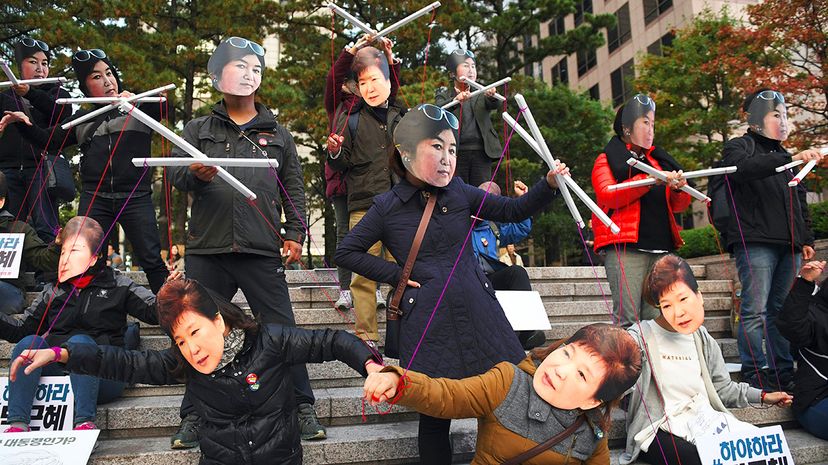
No matter what country you live in, you've likely asked yourself: Who's really in charge here? There have been plenty of puppet governments throughout history to know that they can happen anywhere. In South Korea, this suspicion became all too real, and led to a scandal that rocked the nation in 2016 and landed former-President Park Geun-hye in a detention center on charges of bribery and abuse of power.
What really happened? Listen to this episode of Stuff They Don't Want You To Know as Ben Bowlin, Matt Frederick and Noel Brown attempt to answer: Did a cult try to run South Korea?
Advertisement
Former South Korean President Park Guen-hye has had in interesting life: Her father, President Park Chung-hee, gained power in 1961 after a military coup, but then decided that South Korea should be a democracy. His wife was assassinated in 1974 by a North Korean sympathizer, and Guen-hye assumed the duties of the first lady at the age of 22. Five years later, her father was assassinated in 1979 by his own chief of intelligence. It wasn't about North Korea this time, however; the head of the Korean CIA shot Chung-hee because he was afraid Chung-hee was being influenced by the charismatic religious leader Choi Tae-min.
After her mother's death in 1974, Guen-hye had also become close to Tae-min, who founded the Church of Eternal Life, a sort of mix of Christianity and Buddhism. Of course, Tae-min considered himself the "future Buddha" that could help his members find salvation and eternal life. A former policeman, Tae-min frequently changed his name, married six times and used his Rasputin-like relationship with Guen-hye to collect government bribes while her father was president.
Tae-min is said to have controlled Guen-hye's body and soul, promising he could communicate with her deceased mother via his dreams. Tae-min's daughter, Choi Soon-sil, also claimed to be able to communicate with Guen-hye's late mother. Soon-sil, who was a close confidante to Guen-hye, eventually became the leader of the Church of Eternal Life after Tae-min's death in 1994.
Four years later, Guen-hye returned to politics and less than a year later she was elected president of South Korea in 2012. And it seems her friend Soon-sil took over the role her father had played in Guen-hye's life: chief influencer.
And influence she did: Soon-sil apparently dictated what clothes Guen-hye would wear, down to what colors on what days. And despite having no security clearance or holding a position in the government, Soon-sil edited many of Guen-hye's speeches, influencing South Korea's public policy. Soon-sil also used her connections with Guen-hye to create two nonprofit foundations that took in nearly $70 million in corporate donations, allegedly for her own personal gain. Soon-sil also is accused of using her influence over Guen-hye to get friends and associates government jobs.
Guen-hye's approval rating fell to single digits once South Korean citizens discovered Soon-sil was editing speeches, and Guen-hye was ultimately impeached and is on trial for corruption. She maintains that Soon-sil is just a friend she relied on too much, but that otherwise, nothing inappropriate occurred.
Was this a case of a president leaning too much on her friend for support and guidance? Or was Guen-hye really under the thumb of a religious leader bent on South Korean domination? And what does equestrian dressage have to do with it? To find out all of this and more, you'll have to listen to the podcast.
Advertisement

